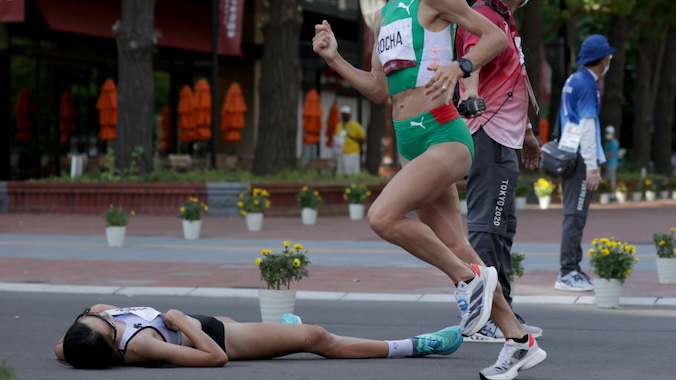Olympic Marathon Will Offer One Last Heat Check
Photo by Yasuyuki Kiriake-Pool/Getty Images
Marathons are not meant to be run in extreme heat. That’s why the Boston Marathon takes place in often chilly early April, Berlin opts for late September, and Chicago and New York wait until October and November to send the thousands of runners out for a punishing few hours. The Summer Olympics, of course, break that rule. This year in boiling Paris, with the races set to act as the traditional capstone of the two-week competition, the runners will face down some brutally hot temperatures.
On Saturday, when the men run, the high is expected to be around 86 degrees F. Sunday, when the women take to the course just hours before the closing ceremonies of the Games, will be even hotter: 93 degrees F.
This is too hot.
A number of studies on marathon results have found that the ideal temperature to run 26.2 miles is between 44 and 59 degrees F. Above that, times start to decline; one study found that for every one-degree Celsius increase in temperature (1.8 degrees F), average Boston Marathon runners lost almost two minutes on their time. Even the elite runners dipped substantially, with winning times slowing by 20 seconds for each degree.
For less conditioned runners, things can get dangerous. For example, in 2007, Chicago recorded its hottest-ever October 7, with the mercury hitting about 88 degrees F; the organizers eventually stopped the race, but not before more than 300 people required hospitalization.
At the last Olympics, officials planned ahead for Tokyo’s brutally hot summers: they left the city entirely. They proactively moved the marathon 500 miles north to Sapporo, on the island of Hokkaido, hoping for cooler temperatures. And even that didn’t help: Sapporo happened to be very hot on the women’s race day as well, with temperatures reaching the high 80s; the starting time was moved back to 6 a.m. to compensate, at least somewhat.
Peres Jepchirchir of Kenya won the women’s race that year. “I’m going to say too hot,” she said afterward. Of 88 entrants, all elite marathoners, 15 did not finish.
In Paris this weekend, expect more of the same. The extreme temperatures will add insult to injury on an already challenging course, rife with hills that coaches and athletes have described as unprecedented. “It’s really hard to imagine how extreme the course is without running it,” one coach told the New York Times. “The course is unlike any major marathon these athletes have ever run.”
It’s also unlike any climate they have ever run in — just as the next Olympic marathon will be warmer still, and so on. Organizers are likely in many cases to follow Japan’s lead, potentially sending the race off to some northern, hopefully cooler clime rather than stay home in boiling Los Angeles, or Athens, or wherever the Games end up in the coming heat-stressed decades.